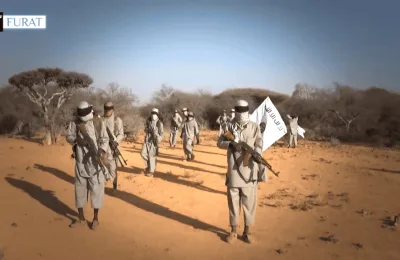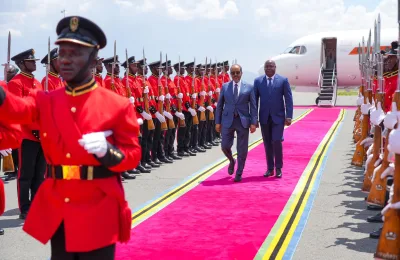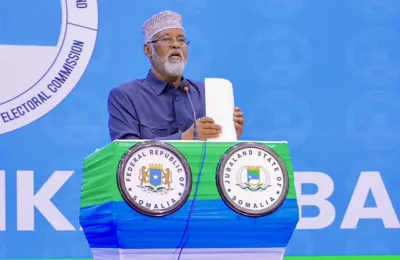Barack Obama is supplying experts to Abuja while Britain is ready to send military support to…
Barack Obama is supplying experts to Abuja while Britain is ready to send military support to pursue Boko Haram militants.


The United States and Britain have offered military and technical support to Nigeria to hunt down the Islamist group which has abducted a new batch of schoolgirls, piling pressure on the Nigerian authorities to find and free the victims.
President Barack Obama led a mounting international outcry on Tuesday and said Nigeria’s government had accepted help from US military and law enforcement officials to pursue Boko Haram militants.
Gunmen believed to be from the group kidnapped eight more girls, aged between eight and 15, in an overnight raid on a village in the sect’s stronghold in north-eastern Borno state on Monday. It was already holding 257 girls from a raid on a school on 15 April.
Obama said the US was doing its utmost to help resolve the “terrible situation” but stopped short of offering to send troops – in contrast to Britain, which is prepared to send special forces and intelligence gathering aircraft.
“In the short term our goal is obviously to help the international community, and the Nigerian government, as a team to do everything we can to recover these young ladies,” Obama told NBC. “But we’re also going to have to deal with the broader problem of organisations like this that … can cause such havoc in people’s day-to-day lives.”
The president said Boko Haram was one of the world’s worst terrorist organisations. “I can only imagine what the parents are going through,” added Obama, a father of two daughters aged 15 and 12.
The offers from Washington and London follow widespread criticism of the Nigerian government’s perceived sluggish response to the crisis. Relatives of the girls have protested in the capital, Abuja.
Boko Haram’s leader, Abubakar Shekau, has threatened to sell the captives into slavery and said militants would attack more schools and abduct more girls. The group’s name means “Western education is sinful”. In a separate atrocity this week militants reportedly shot at least 52 people in a remote village.
White House spokesman Jay Carney said the US embassy in Abuja would help assemble a team of technical experts, including military and law enforcement personnel skilled in intelligence, investigations, hostage negotiating, information sharing and victim assistance. The US was not considering sending armed forces, Carney said.
John Kerry, the secretary of state, said Washington had been in touch with Abuja since “day one”. It rebuffed US offers of help until Tuesday when Kerry spoke with Nigeria’s president, Goodluck Jonathan.
“I think now the complications that have arisen have convinced everybody that there needs to be a greater effort,” Kerry said at a state department news conference. “And it will begin immediately. I mean, literally, immediately.”
In London Whitehall officials said Britain was prepared to send intelligence-gathering aircraft and members of the Special Air Service (SAS), or its naval equivalent, the Special Boat Service (SBS), if asked by Abuja.
Officials at a meeting of the government’s emergency committee, Cobra, discussed options. The Nigerians are expected to make an official request on Wednesday following unofficial talks between London and Abuja.
Urgency grew after Boko Haram released a video threatening to sell their captives as “slaves” and gunmen slaughtered people in the village of Waraba. It straddles the Gwoza mountain range, a network of caves which stretches into neighbouring Cameroon and shelters the militants.
“They were many, and all of them carried guns,” Lazarus Musa, a resident, told Reuters. “They came in two vehicles painted in army colour. They started shooting in our village. The Boko Haram men were entering houses, ordering people out of their houses.”
The village was now deserted, said Marcus James, a Waraba resident who moved to the capital, Abuja, last year to escape cross-border raids. “The last I heard from my relatives is that around two dozen gunmen had been shooting for about three hours. At that time, my family called to say they were hiding in the bush, and I haven’t heard from them since.”
On Monday, Cameroonian officials said two soldiers were killed in a shootout with militants, in the latest sign of insurgents using porous borders to their advantage.
Nigeria’s army has struggled against a fleet-footed enemy which launches lightning raids before disappearing into rugged mountain and desert terrain.
The five-year insurgency in the country’s north-east has claimed more than 4,000 lives and forced almost half a million people to flee their homes, according to International Crisis Group.
The latest assaults come as Nigeria prepares to hold the World Economic Forum in Abuja, where two bombs in the last three weeks have killed at least 95. Roadblocks and security checkpoints have choked traffic as the government seeks to reassure heads of states and dignitaries of their security.
Ordinary citizens have been less convinced. Early on Tuesday, jittery parents in the suburb of Nyanya rushed to pull their children out of school after armed men hijacked an empty private school bus.
The scale and audacity of the 15 April mass abductions in remote Chibok – several truckloads of militants were able to run rampant for almost five hours – has shocked Nigerians.
“We want to know what happens to all the money being spent on security every year. What is it for?” said one protestor in Abuja, referring to the government’s $6bn annual security budget.
Officials have scrambled to provide explanations. On Sunday Patience Jonathan, the president’s wife, accused local officials of being partially responsible for the attacks by opening Chibok school, even though others in the area had shut down.
African leaders have rallied around Nigeria. “All of us are fathers, and I could just imagine that my daughter could be one of them,” said Ghana’s president, John Dramani Mahama, who added he had written a letter on behalf of 14 other west African nations offering assistance.
The United Nations warned that any parties participating in the buying or selling of the schoolgirls could face prosecution under international law. “We warn the perpetrators that there is an absolute prohibition against slavery and sexual slavery in international law,” said UN rights spokesperson Rupert Colville. “So just because they think they are safe now, they won’t necessarily be in two years, five years or 10 years’ time,” he told a news briefing in Geneva.







